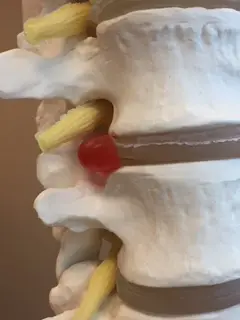Spinal Injuries and Your Rights in North Carolina
A common injury suffered by truck drivers and people who handle freight is a herniated, ruptured, or bulging disc in the lower back or neck. Doctors typically refer to these injuries as either a “bulging disc” or “herniated disc” and sometimes refer to them in their medical notes as an “HNP” or “herniated nucleus pulposus.” The photograph to the right shows a model of a lower back, a lumbar spine, with the bright red area representing a herniation of a disc.
In the picture, you can see the bright red area that is oozing out of the beige colored disc and it is almost making contact with the yellow strand that represents the nerve root coming off of the spinal cord. This is just a model so not all of the nerve is shown. These colors are probably not real-life accurate but are used for illustration purposes.

What happens when a disc herniates or bulges is that the soft jelly-like material inside the disc gets pushed out of the disc and causes inflammation and irritation of the tissues surrounding the disc. The nerve roots that come off of the spinal cord pass by the outer edge of the disc, and when a disc is bulging outward or has herniated, the jelly-like material on the inside of the disc will sometimes squirt out and make contact with that nerve root where it comes off of the spinal cord. This contact irritates that nerve and if it is putting enough pressure on it, it can cause dysfunction in the downstream nerve root distribution for that particular nerve.
This is why when you have a ruptured disc in your lower back, you sometimes have symptoms in your thighs, feet, or the “saddle region” of your body. The saddle region is the portion of your body that would be in contact with the saddle if you were riding a horse. If a herniated disc is bad enough, that is, if it is putting enough pressure on the nerve root, it can cause permanent damage to your bowel function, bladder control, and sexual functions. This is sometimes called “cauda equina syndrome” and it can be both permanent and devastating to someone who suffers this complication.
Treating Spinal Injuries
When conservative measures such as physical therapy and steroid injections fail to eliminate the symptoms of a bulging or herniated disc, a spine surgeon, either an orthopedic spine surgeon or a neurosurgeon, can perform a surgical procedure that removes the herniation and if necessary, remove some of the bony vertebra to make plenty of room for the nerve root. When this surgery is performed in an appropriate patient and carried out by a well-trained surgeon, it often provides the patient with great relief from pain and other symptoms.
However, there is also a condition known as “failed back surgery syndrome” that occurs when this type of surgery is not successful and the symptoms continue. Most patients who suffer from failed back surgery syndrome end up seeing a pain management doctor on a chronic, ongoing basis and end up taking narcotic pain medication for many years. If you have disc material coming into contact with the nerve, you need to have “nerve root decompression surgery” performed sooner rather than later, to prevent permanent nerve damage.
Legal Considerations for Your Spinal Injury
Attorney Bob Bollinger has handled literally hundreds of cases over the years involving disc injuries to the spine. Although lumbar disc injuries are more common than the cervical disc injuries that occur in the neck, the principles are the same for both of them. When a disc in the neck is impinging upon a nerve, it could cause symptoms in the shoulders, arms or hands, or it can also cause symptoms all the way down the body, all the way to the feet, depending on exactly which nerves are affected by the injury.
Under North Carolina’s Workers’ Compensation Act, you do not need a full-blown “injury by accident” in order to have a compensable, or covered, injury to your spine. If you have a “specific traumatic incident” that injures your spine, that can be covered under our workers’ compensation law.
However, I have frequently seen cases where the injured worker suffered a specific traumatic incident and injured his or her back or neck, but the insurance company denied the claim on the basis that there was “no injury by accident.” Well, there was not an injury by accident, but the denial is still incorrect, because the injured worker had a specific traumatic incident and that would be covered! So if your spine injury is denied by the insurance adjuster, don’t assume the denial is legitimate. Contact us for some free advice on how to proceed.
If you think you may have injured your lower back or your neck in an on-the-job incident, the best time to contact us for a free consultation is before you talk to the insurance adjuster. We can explain the law to you and explain what the adjuster will be looking for in the recorded statement that they will ask you for, and armed with that knowledge you might be able to avoid having your claim denied. That “recorded statement” they want from you is all about finding a reason to deny your claim, so be prepared for it!


